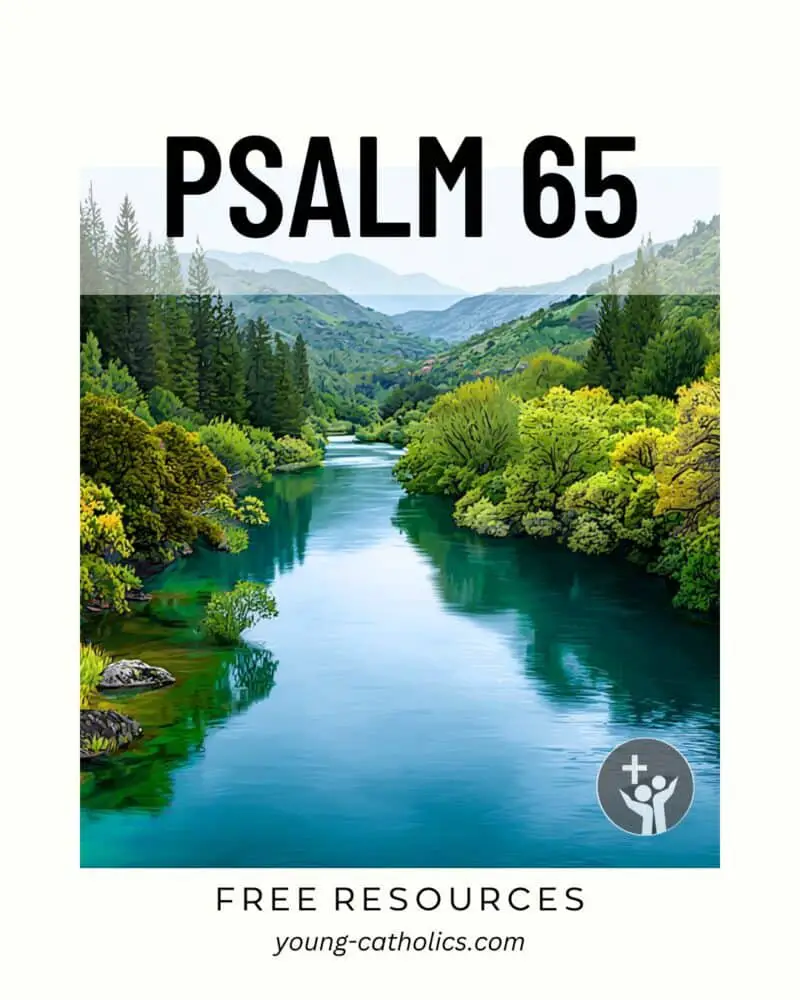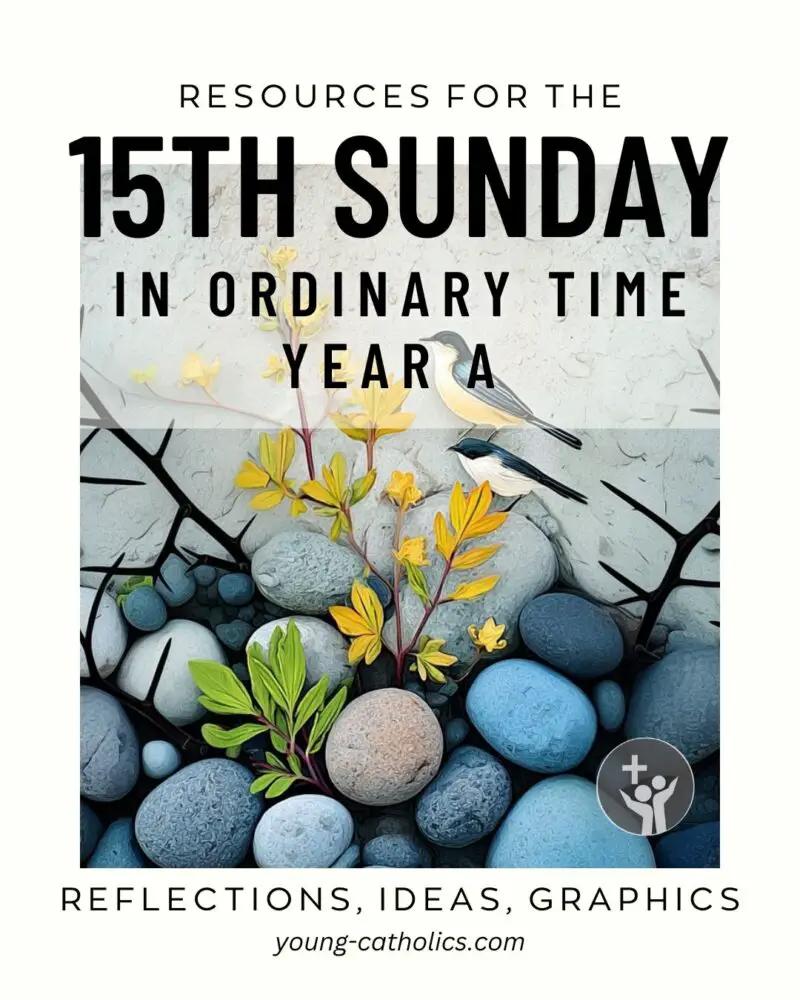Psalm 65

Psalm 65 is a song of praise and thanksgiving. It celebrates God as the creator of the earth and the one who provides for all living things. The psalmist looks at nature and sees the goodness of God in the rains, the harvest, and the beauty of the land. It reminds us that creation itself points to God’s care.
This psalm also speaks of God’s forgiveness. Before praising God for the gifts of nature, it mentions that God forgives sins. The psalm shows that God gives mercy and blessing together. He heals our hearts and also provides what we need for life. Forgiveness and daily bread go hand in hand.
The words of Psalm 65 help us see God as both powerful and gentle. He rules the seas, calms storms, and brings peace to the nations. At the same time, He blesses the soil, waters the fields, and fills the earth with fruit. This balance shows that God’s care is for both great and small things.
For Catholics, Psalm 65 is a reminder of thanksgiving. It calls us to see God’s presence in creation and to give thanks for every gift. Whether it is food on the table, peace in the land, or forgiveness of sins, all comes from God. This psalm invites us to praise with joy and to trust in His care.
A Song Born from Gratitude
This psalm is found in the second book of the Psalms, which runs from Psalm 42 to Psalm 72. This section often speaks of trust in God, His rule over the nations, and His care for creation. Many of these psalms are prayers for help, but this one is different. It is filled with thanksgiving and joy. It praises God for the harvest, the rain, and the order of creation.
Tradition tells us that King David wrote many of the psalms, and Psalm 65 is one of those attributed to him. David often praised God for His power and kindness, and this psalm reflects that same voice of praise. It sounds like a song meant to be used in worship, especially during times of thanksgiving.
Some scholars suggest it may have been sung during a harvest festival. The words about God watering the earth and filling it with grain match that setting. People would gather to thank God for food and for the gift of life. The psalm fits well into that joyful moment.
Knowing this background helps us understand why the psalm is full of images from nature. It is a reminder that the people of Israel lived close to the land. Their lives depended on rain, crops, and herds. When they praised God, they thanked Him for these daily needs, just as we still do today.
Blessings Flow from God
One of the main themes in this psalm is thanksgiving. The psalmist praises God for the earth, the rains, and the harvest. For Catholics, this points us to the Eucharist, which means thanksgiving. Every Mass is a prayer of gratitude for God’s gifts, both in creation and in Christ. The psalm teaches us to live with a thankful spirit.
Another theme is forgiveness. Before speaking of fields and rivers, the psalm talks about God’s mercy for sins. This shows that spiritual needs come first. God heals our hearts and then provides for our bodies. In Catholic life, this reminds us of the Sacrament of Reconciliation, where God’s mercy washes us clean and brings peace.
The psalm also celebrates God’s power over creation. He calms seas and blesses the land with fruit. Catholics see this as part of God’s ongoing work. Creation is not only a gift but also a sign that God is still active in the world. This theme is tied to our call to care for creation, as Pope Francis often reminds us.
Finally, the psalm points to joy in God’s presence. The earth sings, the fields shout for joy, and the hills are clothed in beauty. This joy in creation leads us to worship. In Catholic teaching, all of creation praises God, and we join our voices with it. This theme connects us to the larger family of creation and to God’s goodness.
Giving Thanks in Our Time
This psalm is still very meaningful for us today. We live in a world where it is easy to forget where our food and water come from. Many people are far from farms and fields. Yet this psalm reminds us that every meal and every drink is a gift from God. It calls us to pause and give thanks, even in a busy world.
It also speaks to the need for mercy. Just as the people of Israel turned to God for forgiveness, we also need His mercy in our lives. The psalm teaches us that God is ready to forgive and to welcome us back. This message is timeless. We can bring our sins to Him and find peace.
The psalm also invites us to look at creation with new eyes. In a time of pollution and damage to the earth, the psalm reminds us that God made the world good. We are asked to care for it, not just use it. Catholics are called to be stewards of creation, and this psalm encourages us in that mission.
Finally, it gives us joy. The fields and hills shout for gladness, and we can join in. Even when life is hard, there are still reasons to give thanks. This psalm tells us to find joy in small things and to see God’s hand in all of it.
A Prayer Based on the Psalm 65
A Prayer of Thanks for Today
Lord, you hear our prayers, even when we are unsure what to say.
You forgive us when we fail, and you give us another chance.
Thank you for welcoming us into your presence with love and peace.
You make the earth rich with beauty.
The rain falls, the grass grows, and food fills our tables.
Help us remember that every meal and every drink is a gift from you.
You calm the storms of nature and the storms in our hearts.
When life feels hard, remind us that you are strong and near.
Give us courage to trust you in all things.
The fields shout for joy, and the rivers sing your praise.
Teach us to live with the same joy in our daily lives.
Let our words and actions honor you today and always.
A Song We Pray at Mass
In the Roman Catholic lectionary, parts of Psalm 65 are used as the responsorial psalm during Mass. The verses about God blessing the earth and filling it with grain are often chosen for celebrations of thanksgiving. They remind the Church to give praise for creation and for God’s care.
The psalm also appears in readings connected to God’s mercy. The line about forgiveness before praise shows up in the liturgy to remind us that God’s love is greater than our sins. It helps us prepare our hearts to hear the Gospel.
When this psalm is prayed in the liturgy, it joins our voices with the people of Israel. Their thanksgiving becomes our thanksgiving. Their trust in God’s care becomes our trust. The psalm bridges the past and the present.
By including this psalm, the Church invites us to live in gratitude and joy. Whether the focus is on the harvest, forgiveness, or God’s power over creation, the message is the same. All blessings come from God, and our response is to give thanks.

15th Sunday in Ordinary Time Year A
Year of Abundant Harvest
Psalm 65:10, 11, 12-13, 14 is a song of thanksgiving for God’s care of the earth. It celebrates how God sends rain, softens the soil, and blesses the fields so they produce grain. Every detail of nature is touched by His hand, showing that the harvest is not only the work of people but also a gift from above.
The psalm also pictures creation itself rejoicing. Hills, valleys, and meadows are described as singing with joy because they are filled with life and abundance. For Catholics, this reading reminds us that God is the source of every blessing. It calls us to live with gratitude, knowing that the food on our tables and the beauty of the land all come from Him.
At Weekday Masses
Thursday of the 10th Week in Ordinary Time II – Psalm 65:10, 11, 12-13: Praise in Zion
Resources
Social Media Graphics and Bulletin Artwork
River of Blessings

Bring the beauty of Psalm 65 into your parish or ministry. This image, filled with life and color, is a reminder of God’s care for creation and His gifts that sustain us. Perfect for bulletins, newsletters, or reflection guides, it invites the faithful to pause and give thanks for the blessings of the earth.
Download this image today and share its message of gratitude and joy with your community.
Paid subscribers may download a large copy this digital artwork without watermarks, suitable for use in bulletins, social media, newsletters, etc., free of charge by clicking here. You must be logged in as a paid subscriber to access the file.
Only current paid subscribers have the rights to use the artwork.
Questions and Answers about Psalm 65
What is Psalm 65 about?
Psalm 65 is a song of praise and thanksgiving. It celebrates God’s forgiveness, His care for creation, and His blessings on the earth. It shows gratitude for rain, harvest, and daily needs.
Who wrote Psalm 65?
Tradition says King David wrote it. Many psalms are linked to him, and this one carries the same tone of thanksgiving and trust that we see in other psalms by David.
Why is forgiveness mentioned in this psalm?
The psalmist thanks God for forgiving sins before praising Him for food and rain. This shows that God cares for both our souls and our bodies. Mercy comes before blessing.
How does this psalm connect to Catholic worship?
Catholics pray parts of Psalm 65 in the Mass. It is used in the responsorial psalm to remind us of God’s mercy and His gifts in creation. It also connects to the Eucharist, which means thanksgiving.
What lesson does Psalm 65 teach us today?
It teaches us to give thanks for everything we have, both big and small. It also reminds us to care for creation, trust in God’s mercy, and find joy in His blessings.
Joy in God’s Blessings
Psalm 65 is a song of thanksgiving to God. It praises Him for forgiveness, mercy, and care. The psalmist reminds us that God listens to prayer and welcomes His people. He gives mercy for sins and fills hearts with peace.
The psalm also shows God’s power over nature. He calms the seas, sets the mountains firm, and blesses the earth with rain. The fields grow rich, and the valleys are covered with grain. All of creation sings with joy, giving thanks to the Lord.
For Catholics, this psalm connects to the Eucharist. The word Eucharist means thanksgiving, and in every Mass we thank God for His mercy and His gifts. This psalm reflects that same spirit of gratitude.
Psalm 65 also teaches us to see God’s hand in daily life. Every harvest, every drop of water, and every sign of peace is a gift. It calls us to live with joy, trust, and thanksgiving, knowing that God provides for both body and soul.
Your Turn
Take a few minutes to read Psalm 65. Let the words of thanksgiving guide your own prayer. Notice how the psalm begins with forgiveness and then moves to blessings in creation. This same pattern can shape how we pray. We ask for mercy, and then we thank God for what we have.
We invite you to share your own reflections. How does this psalm speak to your life today? Do you find comfort in its words about forgiveness, or joy in its picture of creation? Add your thoughts in the comment section. Your insights may inspire others to see this psalm in a new way.



